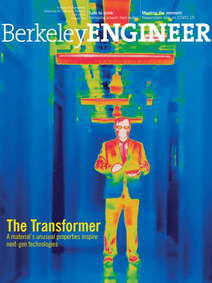 Professor emerita Fiona Doyle, an advocate for students across campus, speaks to a class of Girls in Engineering participants about opportunities in engineering. (Photo by Matt Beardsley)
Professor emerita Fiona Doyle, an advocate for students across campus, speaks to a class of Girls in Engineering participants about opportunities in engineering. (Photo by Matt Beardsley)Q+A on women in engineering
Fiona Doyle is the Donald H. McLaughlin Professor Emerita of Mineral Engineering and special adviser to the dean. During her 36 years at UC Berkeley, she also filled leadership roles across campus, including as dean of the Graduate Division and chair of the Academic Senate. In recognition of the 150th anniversary of the admission of women to Berkeley, we talked with Doyle about her experiences as a woman at Berkeley Engineering.
How did you first become interested in engineering as a career?
Always interested in math and science, I pursued my first degree in metallurgy and materials science as a science at the University of Cambridge. I never thought, “I’m going to be an engineer.” I followed my passions, and my graduate degrees in metallurgy from Imperial College, London happened to be classed as engineering.
Students think that their choice of major will define the rest of their lives. I advise them just to follow their interests — they’ll find their direction and be successful. When combined with technical expertise, having a broader background can lead to more creative problem-solving. It’s a much happier way to live your life — and it’s seriously important to be happy.
A century and a half ‘on equal terms’
This year marks the 150th anniversary of the University of California’s 1870 resolution: “That young ladies be admitted into the University on equal terms in all respects with young men.” The act came just two years after the university’s founding; six years later, Berkeley Engineering had its first female graduate. Today, our female faculty, students and alumni are at the cutting edge of our work: holding tenured positions, serving as mentors, leading groundbreaking research and founding innovative startups. Find their stories at 150 years of women in engineering
You were the third female faculty member hired by the College of Engineering back in 1983, and the first in your department. What was that experience like?
I was only 26 years old, younger than many of the graduate students. I would get two reactions. In the corridors, people thought I was a student. In the office, they assumed that I was Professor Doyle’s secretary. The assumptions and gender stereotypes were annoying, but overall, I was incredibly lucky. Colleagues might have been oblivious to gender issues, but I never felt they were biased against me. Gender bias often arises in situations when men feel threatened, and because I was so junior, I don’t think people were remotely threatened by me. My response was: I’ll show them by doing better than the men.
Elizabeth Bragg, the first woman to receive an engineering degree from an American university, graduated from Berkeley in 1876. But it was nearly 100 years before the college’s first female faculty member, Susan Graham, was hired in 1973. Can you shed any light on why you think it took so long?
Even longer, because Susan Graham was initially hired into computer science in Letters & Science. In addition to few women pursuing research in engineering, I think that, after World War II, the emphasis was on hiring returned servicemen, with women expected to stay home. Across the university there were also many distinguished female researchers, married to male professors, who were every bit as important to the scientific contributions as their husbands but never got real credit.
The real transformation began with Dean Karl Pister, who was determined to enhance the diversity of the college across the board and emphasized hiring women. He took a ridiculous chance on me — I was appointed on April 1, 1983, a week before defending my Ph.D. But within five years, I proved that I was worthy of tenure.
Do you have any particular advice for young women considering an engineering course of study or career?
Be yourself. Don’t compare yourself to the male stereotypes — many stereotypical feminine traits are incredibly useful. Women are often better at multitasking and social intelligence, which can prove invaluable when working with teams. When I started my teaching career, I used to have to watch out for the women in my classes, ensuring they wouldn’t just be appointed the team note taker. By the turn of the millennium, I started to notice that the smart guys would purposely join a team with a woman. A lot of the social stuff associated with teamwork would run more smoothly.
Overall, I’d say: Don’t feel shy about asking questions. You’re smart, you’ll learn what you need to learn. And you’ll bring so much to the table that you’ll eventually be immensely successful.

